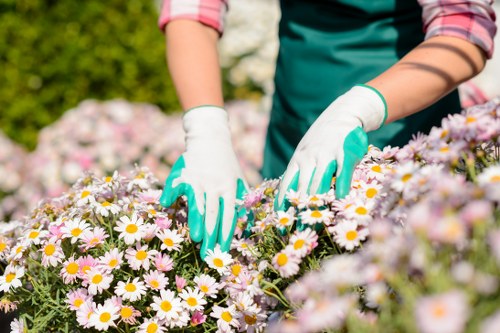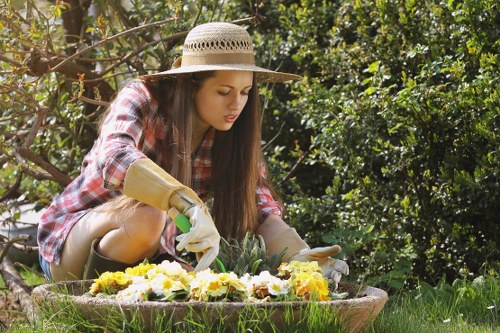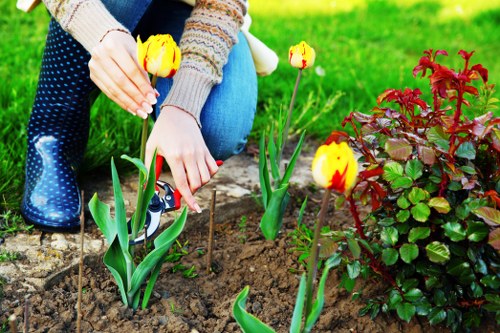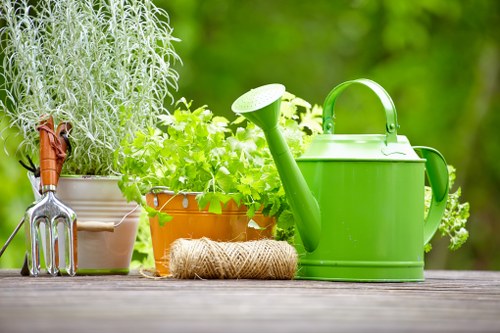Gardeners Queens Park: A Comprehensive Guide

Queens Park is a haven for gardeners, offering a blend of natural beauty and community spirit. Whether you're a seasoned gardener or just starting out, Queens Park provides everything you need to cultivate your green space.
The area's rich soil and favorable climate make it ideal for a variety of plants. From vibrant flowers to robust vegetables, gardeners in Queens Park have access to a diverse range of flora.
Community gardens and local nurseries add to the charm, providing resources and support for all gardening enthusiasts.
The Community of Gardeners in Queens Park

The community of gardeners in Queens Park is known for its friendliness and collaborative spirit. Residents often share tips, swap seeds, and help each other with gardening projects.
Local gardening clubs and organizations play a significant role in fostering this sense of community. They organize workshops, plant exchanges, and garden tours throughout the year.
These groups are perfect for anyone looking to enhance their gardening skills or simply connect with like-minded individuals.
Local Gardening Events and Workshops

Queens Park hosts a variety of gardening events and workshops that cater to all skill levels. From beginner classes on basic planting to advanced seminars on sustainable gardening practices, there's something for everyone.
These events are often held in local community centers, parks, and gardens, making them easily accessible to all residents.
Participating in these workshops not only helps improve your gardening techniques but also allows you to meet fellow gardening enthusiasts.
Essential Gardening Resources in Queens Park

Queens Park is well-equipped with resources that support gardeners in their endeavors. Local nurseries offer a wide selection of plants, tools, and supplies to help you maintain a healthy garden.
Additionally, the area boasts several greenhouse facilities where gardeners can purchase or trade exotic and hard-to-find plants.
Libraries and online platforms also provide valuable information on gardening best practices, pest management, and plant care.
Top Nurseries and Plant Shops

Queens Park is home to some of the best nurseries and plant shops in the region. These establishments offer a variety of plants, from seasonal flowers to perennial favorites.
Many nurseries also provide gardening supplies, including pots, soil, fertilizers, and gardening tools, ensuring that gardeners have everything they need in one place.
Staff at these nurseries are often knowledgeable and willing to share their expertise, making them a valuable resource for both new and experienced gardeners.
Gardening Tips for Queens Park
Choosing the Right Plants
When selecting plants for your garden in Queens Park, it's important to consider the local climate and soil conditions. Native plants are often a good choice as they are well-suited to the environment and require less maintenance.
Additionally, selecting plants that bloom at different times of the year can ensure a vibrant and colorful garden throughout all seasons.
Don't forget to consider the sunlight and water requirements of each plant to ensure they thrive in your specific garden setup.
Soil Preparation and Maintenance
Good soil is the foundation of a healthy garden. In Queens Park, the soil is typically rich in nutrients, but regular maintenance is still essential.
Incorporate organic matter such as compost or well-rotted manure to improve soil structure and fertility.
Proper drainage is also crucial to prevent waterlogging and root diseases, so be sure to amend your soil accordingly.
Pest and Disease Management
Managing pests and diseases is a common challenge for gardeners. In Queens Park, natural remedies and organic treatments are highly recommended to maintain a healthy garden ecosystem.
Encourage beneficial insects like ladybugs and bees, which help control pest populations naturally.
Regular monitoring and early detection are key to preventing the spread of diseases and minimizing damage to your plants.
Designing Your Garden in Queens Park
Planning Your Garden Layout
Effective garden design starts with careful planning. Consider the size and shape of your garden space, as well as the types of plants you wish to grow.
Creating zones for different plant types, such as vegetables, flowers, and herbs, can help organize your garden and make maintenance easier.
Incorporate pathways and seating areas to enhance the functionality and aesthetics of your garden.
Choosing Garden Structures
Adding structures like trellises, pergolas, and garden beds can enhance the beauty and utility of your garden in Queens Park.
These structures not only provide support for climbing plants but also add visual interest and create designated areas within your garden.
Consider sustainable materials and designs that complement the natural environment of Queens Park.
Incorporating Sustainable Practices
Sustainability is increasingly important in gardening. Implementing practices such as composting, rainwater harvesting, and using native plants can reduce your garden's environmental impact.
These methods not only promote a healthier garden but also contribute to the overall well-being of the Queens Park community.
By adopting sustainable gardening practices, you can create a resilient and eco-friendly garden that thrives year after year.
Gardening Tools and Equipment
Essential Tools for Every Gardener
Having the right tools is essential for maintaining a beautiful garden. Some must-have tools for gardeners in Queens Park include:
- Hand trowel
- Pruning shears
- Garden gloves
- Watering can or hose
- Garden fork
Investing in quality tools ensures durability and ease of use, making your gardening tasks more efficient and enjoyable.
Advanced Gardening Equipment
For those looking to take their gardening to the next level, advanced equipment can be a valuable addition. Consider items such as:
- Rotary tillers for soil preparation
- Greenhouse kits for year-round gardening
- Composting bins for organic waste management
- Automated watering systems for consistent moisture levels
These tools can help streamline your gardening process and enhance the overall health and productivity of your garden.
Maintenance and Storage Tips
Proper maintenance of your gardening tools extends their lifespan and ensures they remain effective. Clean and dry tools after each use to prevent rust and corrosion.
Store your tools in a designated area, such as a shed or garage, to protect them from the elements and keep your garden organized.
Regularly inspect your tools for any signs of wear and tear, and replace or repair them as needed to maintain their functionality.
Local Gardening Services in Queens Park
Professional Landscaping Services
If you're looking to transform your garden, professional landscaping services in Queens Park can provide expert guidance and assistance. These services offer customized designs, installation, and maintenance plans tailored to your specific needs.
Working with a professional landscaper ensures that your garden is both beautiful and functional, incorporating elements that enhance your outdoor space.
Additionally, landscaping professionals can help with large-scale projects, such as installing irrigation systems or creating hardscape features.
Garden Maintenance Services
For busy gardeners or those who prefer assistance with upkeep, garden maintenance services are available in Queens Park. These services typically include tasks like pruning, weeding, planting, and seasonal clean-ups.
Regular maintenance helps keep your garden healthy and vibrant, allowing you to enjoy the beauty of your outdoor space without the hassle of constant upkeep.
Hiring a maintenance service can also provide peace of mind, knowing that your garden is in expert hands.
Consultation and Design Services
Consultation and design services are perfect for gardeners looking to plan or redesign their gardens. These services offer personalized advice on plant selection, garden layout, and sustainable practices.
Consultants work closely with you to understand your vision and create a garden that reflects your personal style and preferences.
Design services can also include detailed plans and drawings, ensuring that your garden project is well-organized and executed smoothly.
Gardening for Different Seasons in Queens Park
Spring Gardening Tips
Spring is a wonderful time to start new gardening projects. Focus on planting early-blooming flowers, vegetables, and herbs as the weather begins to warm.
Preparing your soil by adding compost and other organic matter will provide the necessary nutrients for your plants to thrive.
Regular watering and protection against late frosts are essential to ensure the healthy growth of your spring plants.
Summer Gardening Tips
During the summer months, maintaining adequate moisture levels is crucial. Consider using mulch to retain soil moisture and reduce weed growth.
Pruning and deadheading flowers can encourage continuous blooming and keep your garden looking tidy.
Summer is also a great time to harvest vegetables and enjoy the fruits of your labor.
Autumn Gardening Tips
Autumn is ideal for planting perennials and preparing your garden for the colder months. Clean up fallen leaves and debris to prevent pests and diseases.
Adding compost in the fall enriches the soil, providing nutrients that will benefit your garden in the spring.
Protect delicate plants by mulching and covering them to shield against frost and frost damage.
Winter Gardening Tips
Winter gardening focuses on planning and maintenance. Review your garden’s progress over the year and plan for the upcoming season.
Prune dead or damaged branches from trees and shrubs to promote healthy growth in the spring.
Protect sensitive plants by bringing them indoors or covering them with protective materials to prevent frost damage.
Gardening Sustainability in Queens Park
Composting and Waste Management
Composting is an essential practice for sustainable gardening. It reduces waste by recycling organic material into nutrient-rich compost that enhances soil fertility.
Queens Park offers community composting programs and resources to help gardeners manage their organic waste effectively.
Implementing composting in your garden not only benefits your plants but also contributes to a healthier environment.
Water Conservation Techniques
Water conservation is crucial, especially during the hot summer months. Techniques such as drip irrigation and rainwater harvesting can significantly reduce water usage in your garden.
Mulching also helps retain soil moisture, reducing the need for frequent watering.
Choosing drought-resistant plants can further enhance your garden's ability to thrive with minimal water.
Growing Native and Drought-Resistant Plants
Native and drought-resistant plants are well-suited to the local climate and require less maintenance. They provide habitat for local wildlife and promote biodiversity.
Incorporating these plants into your garden not only reduces the need for excessive watering and fertilization but also supports the local ecosystem.
Queens Park’s diverse plant selection includes a variety of native species that are perfect for sustainable gardening practices.
10-15 Nearby Areas to Queens Park
- Kensington Gardens: A short distance from Queens Park, offering expansive green spaces and beautiful flowerbeds.
- Regent's Park: Known for its stunning gardens and boating lake, ideal for relaxation and gardening inspiration.
- St. John's Wood: Features lovely community gardens and local nurseries catering to gardeners.
- Maida Vale: Home to several small parks and private gardens that showcase unique plant varieties.
- Notting Hill: Famous for its colorful gardens and vibrant plant markets.
- Hampstead: Offers lush green spaces and a variety of horticultural activities.
- Chiswick: Known for its riverside gardens and extensive plant collections.
- Swiss Cottage: Features well-maintained public gardens and gardening clubs.
- Fitzrovia: Offers compact urban gardens and rooftop green spaces.
- Camden: Known for its eclectic gardens and diverse plant species.
- Greenwich: Features large parks and botanical gardens perfect for gardening enthusiasts.
- Marylebone: Home to beautiful private and community gardens with a variety of plants.
- Belsize Park: Offers charming garden spaces and local gardening events.
- Bloomsbury: Features historical gardens and modern green initiatives.
- Paddington: Known for its riverside gardens and community gardening programs.
Conclusion
Queens Park is a gardener's paradise, offering a supportive community, abundant resources, and beautiful natural surroundings. Whether you're looking to start a new garden, improve your existing one, or connect with fellow gardening enthusiasts, Queens Park has everything you need to succeed.
Embrace the opportunities that Queens Park provides and cultivate a garden that not only enhances your home but also contributes to the vibrant community spirit of this lovely area.
FAQs
1. What types of plants grow best in Queens Park?
Queens Park's climate and soil are suitable for a wide range of plants, including native species, perennials, vegetables, and drought-resistant varieties. It's best to choose plants that thrive in the local conditions to ensure a healthy and vibrant garden.
2. Are there community gardening programs available in Queens Park?
Yes, Queens Park has several community gardening programs and local gardening clubs that offer resources, workshops, and opportunities for gardeners to collaborate and share knowledge.
3. Where can I find gardening supplies near Queens Park?
There are numerous local nurseries and plant shops in and around Queens Park that offer a wide selection of gardening supplies, including plants, tools, soil, and fertilizers.
4. How can I join a gardening club in Queens Park?
You can join a gardening club by attending local events, visiting community centers, or searching online for clubs that meet in Queens Park. These clubs often welcome new members and provide various activities and resources for gardeners.
5. What are the best practices for sustainable gardening in Queens Park?
Sustainable gardening practices in Queens Park include composting, water conservation techniques like drip irrigation, using native and drought-resistant plants, and minimizing the use of chemical pesticides and fertilizers. These practices help create an eco-friendly and resilient garden.
